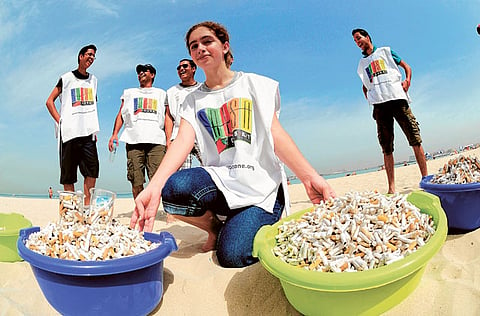513,554 butts on the beach in Dubai
Voluntary group finds over half a million cigarette butts on Dubai beaches in just 14 hours

Dubai: A Dubai-based group of volunteers is aiming to clear the UAE of cigarette butt litter after a beach-combing effort on city beaches yielded more than half a million filters in just 14 hours.
Called Operation Ozone, the massive beach clean-up was undertaken over 16 different days between January and December 2011, amounting to a total search time of 14 hours, when some 1,200 volunteers collected 513,554 cigarette butts from the beaches of Jumeirah Beach Residence (JBR), Burj Al Arab, Jumeirah Open Beach and Mamzar Park.
"Now, we want to take the campaign nationwide as there is clearly a need for it. We are looking for a corporate sponsor to cover the operational costs and welcome any support towards this end," said Lola Lopez, founder of the non-profit Volunteer in Dubai, which has initiated Operation Ozone.
Other emirates
She said the group is planning to cover beaches and other public places across all the emirates. "In fact, we are prepared to go to any place that requires a clean-up if we get the backing," she said, adding that they had zeroed in on Discovery Garden in the next two weeks.
"The butt litter in this area is unforgivable. I am currently in the process of getting 120 volunteers together to clean up 12 streets and raise awareness among smokers about how needless their manner of cigarette disposal is," she said. "They don't think twice before throwing their cigarettes on the ground."
Concerns over the ugly sight of butt litter and their threat to the environment came to the fore when a pilot project launched by Lopez on the JBR beachfront in November 2010 yielded 45,000 butts in just one hour. With beach clean-ups in the past proving that butt collection is difficult as the filters are small and hidden under the sand, it became clear that it required a more focused approach.
Lopez said her decision to launch a sustained initiative received an encouraging response with volunteers managing to collect 513,554 butts over the next 12 months. It was a purely voluntary effort, with those who gathered the most filters getting free meal vouchers by a local restaurant Salsa as an incentive.
The maximum collections were made at the JBR beach with 47 volunteers picking up 66,470 butts on January 29 and 64 volunteers amassing 51,510 butts on March 19 (see box).
"If this is what we could collect through random one-hour searches, imagine how many more there must be in open areas across the UAE," said Lopez.
A non-profit group called Ocean Conservancy has found that butts account for 28 per cent of littered items washing up on beaches across the globe. According to Lopez, smokers worldwide deposit 4.5 trillion cigarette butts - that's over eight million a minute. "If you stacked them on top of each other, end to end, they would perhaps stretch to the moon and back — 150 times."
The real danger of accumulated butts lies in the cigarette filters which are composed of cellulose acetate, a form of plastic that many researches believe is non-biodegradable and can cause serious harm when ingested by marine animals. Studies have shown that the plastic filters release toxic chemicals, including nicotine, benzene and cadmium.
Endangering lives
"The plastic been found in the stomachs of fish, birds, whales and other marine animals which mistake them for food. So it endangers their lives," said Lopez.
Beach-going families also complain of the sore sight of butt litter and the hazards to humans. "I cannot let my three-year-old girl play in the sand because of these butts," said Chitra Ramesh, a resident of Dubai. "She nearly put one of them in her mouth on the JBR beach the other day before I stopped her."
"I take my boys to the beach to enjoy the fresh air. Why should we be subjected to passive smoking?" asked Jessica Brown, another concerned resident.
The federal smoking ban in the country currently does not extend to open beaches although it covers closed public spaces like malls, hospitals, educational institutions, mosques and sports facilities. In addition, the Dubai Municipality has asked hotels, motels, resorts and dormitories to designate special areas for smoking. Restaurants and cafes are required to put clear signs separating areas for smokers and non-smokers. Any violation results in fines ranging from Dh1,000 to Dh10,000.
There has also been talk of the municipality considering the introduction of indoor smoking areas on Dubai's beaches and in parks to prevent people from smoking in family areas. But plans to set up these indoor designated zones for smokers in open-air public areas are yet to take off.
Smokers, however, feel it would be unfair to restrict them from lighting up in such environs. "People should not be prevented from smoking in the open. It would be most unfair," said a British tourist.
"There are dustbins installed every few metres. Having more concrete planters or receptacles to stub out cigarettes would solve the problem," suggested Bob, a smoker in the JBR area.
Another resident, who lives in an apartment in Bur Dubai, said he largely smoked outdoors and three out of five cigarettes ended up on the roadside. "Truth be told, it feels good to crush that butt down on the ground with my heel after a nice long, puff. It's like a de-stress."
"Smokers may not realise that their actions have a lasting, negative impact on the environment. But we hope to create greater awareness among them by stepping up Operation Ozone across the emirates," said Lopez.
She also wants to display the half million butts in a giant transparent container at a public place as a silent symbolic protest before contacting Dubai Municipality for their eventual disposal.
"We are looking for someone who can help us take this idea forward," she added.



